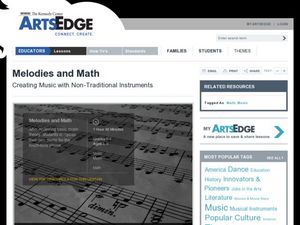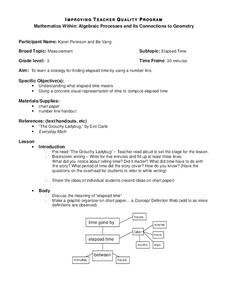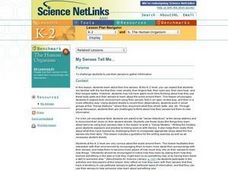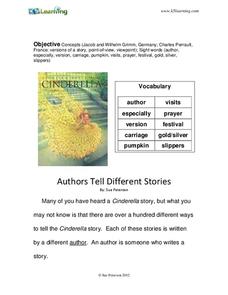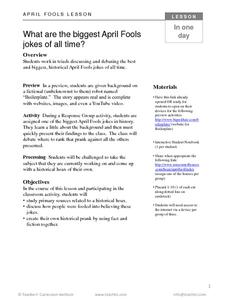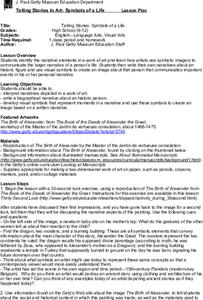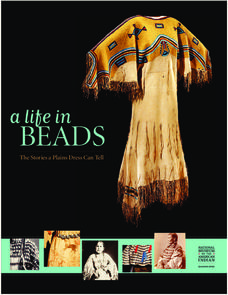Curated OER
Melodies and Math: Creating Music with Non-Traditional Instruments
Review the 4/4 and 2/4 time signatures in music with a helpful music theory lesson plan. Young musicians experiment with electronic sounds and create their own musical performance using instruments made from materials found in the...
Curated OER
Every Picture Tells a Story
Students consider controversial photos of Elian Gonzalez and decide how they, as editors of the Times, might have displayed them. They choose, discuss, and write about other famous images from photojournalism to decide what makes the
Curated OER
Measurement
Third graders explore a strategy for finding elapsed time by using a number line. They identify what elapsed time means. Students investigate a concrete visual representation of time to compute elapsed time. They read, " The Grouchy...
Curated OER
Volunteering Our Time
Students participate in a service learning project. In this philanthropy lesson, students volunteer their time at a local soup kitchen and reflect upon the experience in a journal.
Curated OER
Telling Our Stories of Giving - Writing to Persuade
After identifying the parts of a persuasive piece of writing, young writers explore different prewriting activities for the persuasive essay. They have the option to write a news article, personal narrative, or persuasive essay to...
Curated OER
Prepositions Can Show Positions in Time
Who knows where or when? The preposition knows! Young grammarians are asked to identify the preposition and the connecting prepositional phrases in 16 sentences. An answer key is provided.
Curated OER
My Senses Tell Me...
Students work at "Sense Stations" to explore each of the five senses.
North Carolina Consortium for Middle East Studies
Missing Pieces of the Puzzle: African Americans in Revolutionary Times
What's missing from most studies of the American Revolutionary War is information about the role African Americans played in the conflict. To correct this oversight, middle schoolers research groups like the Black Loyalists and Black...
K12 Reader
An Adverb Can Tell When
First, suddenly, always. Adverbs that provide additional information about when an action occurred are the focus of this one-page worksheet.
Curated OER
Every Building Tells a Story
Examine images from past that depict buildings and towns from their own communities, and compare images with photographs taken at present locations, interview local architect and compare role of 19th Century architect to 21st Century...
K5 Learning
Authors Tell Different Stories
The story of Cinderella is a popular one! So much so, there are multiple versions of the story being told around the world. With this collection of activities your young readers receive background information about two versions...
Canadian Museum of Civilization Corporation
Artifacts Tell Stories: Creating a First World War Museum in the Classroom
Although designed for the Canadian War Museum, the concept here is a solid one. Class members select an artifact from the First World War, examine it, research it, and craft an explanative label that they attach to their picture and post...
TCI
What Are the Biggest April Fools Jokes of All Time?
After working in groups to analyze primary sources related to a historical hoax, learners will discuss how people managed to be fooled and work to identify one of the biggest April Fools jokes in history.
Curated OER
Telling Stories in Art: Symbols of a Life
Through a series of activities, learners are exposed to how artists use symbolic imagery to create the narrative of a subject’s life. They study The Birth of Alexander and some manuscripts kept at J. Paul Getty Museum. They then draft...
Smithsonian Institution
A Life in Beads: The Stories a Plains Dress Can Tell
Young learners discover how the Sioux and Assiniboine tribes preserved native culture through the making of traditional dresses, identifying the resources used to make the dresses and discussing behind the meaning behind some American...
National Gallery of Canada
The Body Tells Its Story
Incorporate sculpture into your art curriculum. To start, pupils discuss the artistic process and topics of marginalization. With the discussion in mind, individuals select images to inspire sculptures of people that they will present to...
Chicago Botanic Garden
What Can Tree Rings Tell Us About Climate?
Tree rings are slightly thicker on the south side of the tree because it receives more sunlight. Part two in a series of five lessons helps learners analyze tree rings to determine the environmental conditions that caused size...
Leading Learner
Using Music to Tell a Story or Describe a Scene
Young composers demonstrate their understanding of the stylistic features of descriptive music, including pitch, tempo, dynamics, rhythm, and timbre, by developing a melody and countermelody for a main character in a story. As part of...
News Literacy Project
News Goggles: Ad or News?
Ever seen the labels "sponsored content," "native advertising," "advertorial," "paid post," "#ad," or "#sponsored?" If so, then you are looking at advertisements that are designed to appear as news stories. Learn how to tell the...
Curated OER
Pumpkin Time
Students visit a pumpkin farm and discuss the characteristics of a pumpkin and how they grow. They create a class story about the trip to the farm with each student supplying a sequence for the story.
Council for Economic Education
Tax Time Scavenger Hunt
Is a 1040EZ tax form really easy? Scholars investigate the complexities of the United States taxation system with an economics lesson. Using a wide variety of web sources, they interpret IRS taxation rules and regulations to better...
Seussville
It's Time to Play Seuss-Aphone!
Play a game of telephone, Dr. Seuss style! Kids can use the suggested phrases listed on this page or choose any silly sentence that the famous cat wearing a hat says. See the materials for two more activities.
Novelinks
Zach’s Lie: Guided Imagery
Close your eyes and picture a time where you decided to tell the truth to someone. What were you wearing? How did you feel? Such prompts begin a guided imagery activity for Zach's Lie. Directions for creating an environment conducive to...
Howard Hughes Medical Institute
Weighing the Evidence for a Mass Extinction Part 2: On Land
What can fossils tell us about periods of extinction? Young scholars interpret fossil layers to make conclusions about changes in life during different geological time periods. They analyze the fossils for abundance and diversity as well...
Other popular searches
- Telling Time Lesson
- Calendar Telling Time
- Telling Time Analog
- Spanish Telling Time
- Telling Time to the Half Hour
- Telling Time Clocks
- Telling Time Worksheets
- Telling Time to the Hour
- Telling Time to the Minute
- Telling Time Hour
- Telling Time Minute
- Telling Time Lesson Plans


